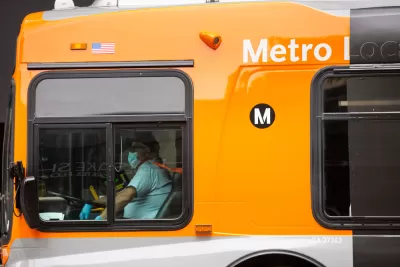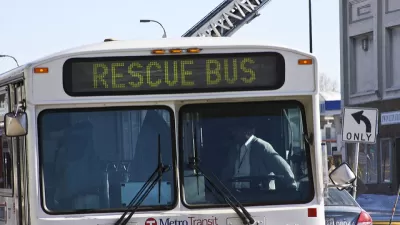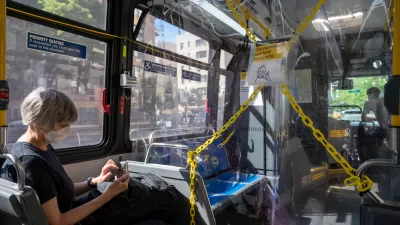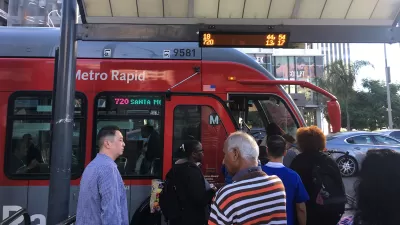Equity illuminates the light at the end of the tunnel for U.S. transit agencies, according to a recent report by the Urban Institute.

The Urban Institute and the American Public Transportation Association's Center for Neighborhood Technology this week published a new study that tracks the efforts of North American public transit agencies planning a return to regular activity.
A pair of articles published on the Urban Institute website introduce the new study and introduce key concepts for the research, such as ridership trends and equity-centering responses.
According to the first article, written by Jorge Morales-Burnett and Yonah Freemark, "Equity had a major role in how some agencies responded, and they offer lessons for how others can prioritize equity as we recover from the pandemic." The article notes a particularly salient example from Denver, where "transit ridership actually increased over the pandemic in neighborhoods with relatively low incomes (median household incomes of $35,000 or less), while it declined in wealthier neighborhoods (median household incomes of $55,000 or more)."
The article also notes that interviews with transit workers revealed how staff gained new awareness about equity during the pandemic. "One agency CEO noted, 'We recognized through COVID that transit is critical... [that it is] a lifeline service for people. We need to rethink the model,'" according to the article.
Some of the responses by transit agencies that accounted for equity included increased local service and decreased express service (particularly from more suburban areas to downtown cores or suburban tech hubs). This trend made the news on Planetizen in November 2020, when the Massachusetts Bay Transportation Authority announced plans to cut commuter rail and focus on bus service.
The second article, also written by Morales-Burnett and Freemark, digs more into the details of how transit agencies are ramping back up to normal, pre-pandemic service levels. According to Morales-Burnett and Freemark, returning to normal will require transit agencies to provide effective, equity focused transit service. The article includes a list of best practices for achieving that goal.
Not mentioned in the article, but material to the goals of transit agencies for getting back on track, is an ongoing driver shortage, which is affecting service and operations in more cities with every passing week. The issue is significant enough that TransitCenter this week Tweeted that the driver shortage is the biggest challenge facing transit agencies at the end of the second year of the pandemic—a notable shift from the funding crises of the beginning of 2020, but an existential threat nonetheless.
FULL STORY: The Ways Transit Agencies Adapted during the Pandemic Can Inform an Equitable Recovery

Alabama: Trump Terminates Settlements for Black Communities Harmed By Raw Sewage
Trump deemed the landmark civil rights agreement “illegal DEI and environmental justice policy.”

Study: Maui’s Plan to Convert Vacation Rentals to Long-Term Housing Could Cause Nearly $1 Billion Economic Loss
The plan would reduce visitor accommodation by 25% resulting in 1,900 jobs lost.

Why Should We Subsidize Public Transportation?
Many public transit agencies face financial stress due to rising costs, declining fare revenue, and declining subsidies. Transit advocates must provide a strong business case for increasing public transit funding.

Paris Bike Boom Leads to Steep Drop in Air Pollution
The French city’s air quality has improved dramatically in the past 20 years, coinciding with a growth in cycling.

Why Housing Costs More to Build in California Than in Texas
Hard costs like labor and materials combined with ‘soft’ costs such as permitting make building in the San Francisco Bay Area almost three times as costly as in Texas cities.

San Diego County Sees a Rise in Urban Coyotes
San Diego County experiences a rise in urban coyotes, as sightings become prevalent throughout its urban neighbourhoods and surrounding areas.
Urban Design for Planners 1: Software Tools
This six-course series explores essential urban design concepts using open source software and equips planners with the tools they need to participate fully in the urban design process.
Planning for Universal Design
Learn the tools for implementing Universal Design in planning regulations.
Smith Gee Studio
Alamo Area Metropolitan Planning Organization
City of Santa Clarita
Institute for Housing and Urban Development Studies (IHS)
City of Grandview
Harvard GSD Executive Education
Toledo-Lucas County Plan Commissions
Salt Lake City
NYU Wagner Graduate School of Public Service





























